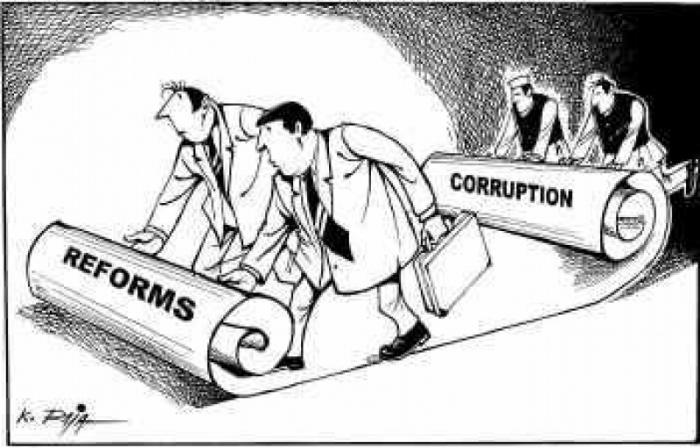What do we mean by "Corruption"?
Blog
02
Dec
2015 02:47
It is widely recognized among academics and practitioners that there is no single, commonly agreed definition of corruption. However, most people and organizations focusing on corruption-related matters certainly would agree that corruption involves the abuse/misuse of a position of power or authority for monetary gain or non-material advantages (for instance an improvement in status/position). These forms of corruption may occur at any level of a private or public organization, from the office file carrier to the international business manager. This situation is mirrored in the state hierarchy, where any official with some kind of authority, from a police constable to higher-level government officials, has the opportunity, and often does engage in corruption.
Here is a brief assessment of the main types of corrupt activities that currently sclerose Nepal (and which Anticorruption Movement Nepal concerns itself with) :
• International charity donations and aid intended to be given to 'worthwhile' Non-Governmental Organizations (NGO), for the benefit of disadvantaged members of the Nepalese society often finds its way in to the pockets of some 'bogus' NGOs, or is only partially used by more reputable NGOs for its intended purpose.
• In the same way, public funds are massively embezzled for private purposes.
• A common, yet extremely severe form of corruption, which does not even necessarily require a position of authority, is the area of tax offences. These may be subdivided into two categories.
1. Tax evasion requires no official position of authority and may be carried out by any member of the Nepalese society who chooses not to pay the tax percentage corresponding to their (real) revenue to the government.
2. Another kind of fraud strikes in customs and excise departments. An import tax may be wavered by a customs and excise officer, if the individual wishing to import the goods is prepared to pay them a lesser sum of money (bribe). Of course, none of the money paid to the customs official goes to the national treasury and therefore, it cannot be used for the benefit of the Nepalese people.
Anticorruption Movement Nepal acknowledges that a low-level employee stealing from the organization or firm he is working for can also be construed as corruption. However, for reasons of scale, we consider that higher-level, « great » corruption is even more harmful for the social and economic progress of the people, which is why we primarily dedicate ourselves to address the latter.
Definition by: AMN Members
Here is a brief assessment of the main types of corrupt activities that currently sclerose Nepal (and which Anticorruption Movement Nepal concerns itself with) :
• International charity donations and aid intended to be given to 'worthwhile' Non-Governmental Organizations (NGO), for the benefit of disadvantaged members of the Nepalese society often finds its way in to the pockets of some 'bogus' NGOs, or is only partially used by more reputable NGOs for its intended purpose.
• In the same way, public funds are massively embezzled for private purposes.
• A common, yet extremely severe form of corruption, which does not even necessarily require a position of authority, is the area of tax offences. These may be subdivided into two categories.
1. Tax evasion requires no official position of authority and may be carried out by any member of the Nepalese society who chooses not to pay the tax percentage corresponding to their (real) revenue to the government.
2. Another kind of fraud strikes in customs and excise departments. An import tax may be wavered by a customs and excise officer, if the individual wishing to import the goods is prepared to pay them a lesser sum of money (bribe). Of course, none of the money paid to the customs official goes to the national treasury and therefore, it cannot be used for the benefit of the Nepalese people.
Anticorruption Movement Nepal acknowledges that a low-level employee stealing from the organization or firm he is working for can also be construed as corruption. However, for reasons of scale, we consider that higher-level, « great » corruption is even more harmful for the social and economic progress of the people, which is why we primarily dedicate ourselves to address the latter.
Definition by: AMN Members

